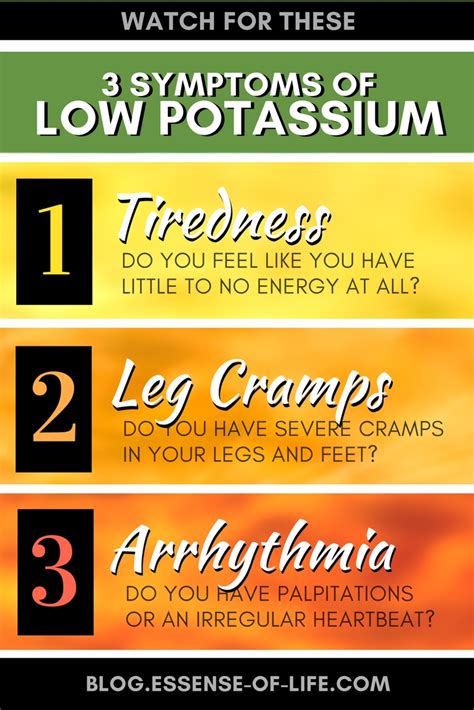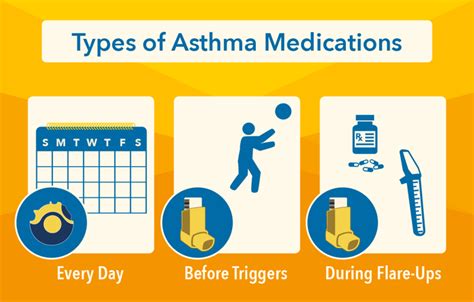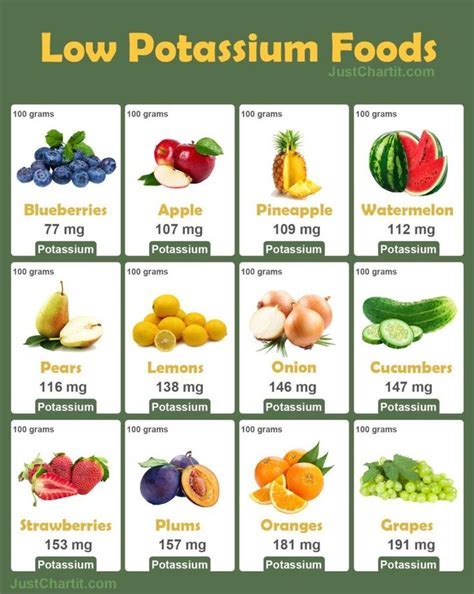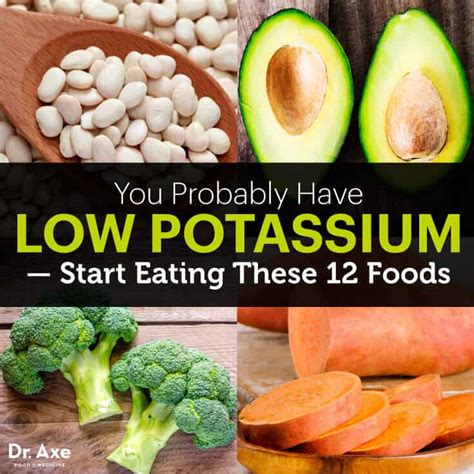Intro
Discover 5 ways to treat low potassium levels, alleviating hypokalemia symptoms with dietary changes, supplements, and natural remedies, including potassium-rich foods and electrolyte balance techniques.
Low potassium levels, also known as hypokalemia, can have serious health implications if left untreated. Potassium is an essential mineral that plays a crucial role in maintaining various bodily functions, including heart function, muscle contractions, and nerve function. When potassium levels drop, it can lead to muscle weakness, fatigue, and heart palpitations. In severe cases, hypokalemia can cause respiratory failure, paralysis, and even death. Therefore, it is essential to treat low potassium levels promptly and effectively.
The importance of treating low potassium levels cannot be overstated. Potassium helps regulate fluid balance, blood pressure, and pH levels in the body. It also enables the transmission of nerve impulses, which is critical for muscle function and overall health. When potassium levels are low, the body's ability to perform these functions is impaired, leading to a range of symptoms and potentially life-threatening complications. Fortunately, there are several ways to treat low potassium levels, and with the right approach, it is possible to restore potassium levels to normal and prevent long-term damage.
Treating low potassium levels requires a comprehensive approach that addresses the underlying causes of the condition. This may involve dietary changes, supplements, and medical treatment. In some cases, hospitalization may be necessary to ensure close monitoring and treatment. The goal of treatment is to restore potassium levels to normal, alleviate symptoms, and prevent complications. With prompt and effective treatment, it is possible to manage low potassium levels and prevent long-term damage.
Understanding Low Potassium

Causes of Low Potassium
Some of the common causes of low potassium levels include: * Dietary deficiencies * Certain medications, such as diuretics and laxatives * Underlying medical conditions, such as kidney disease, adrenal gland disorders, and hormonal imbalances * Excessive sweating or vomiting * Certain medical procedures, such as surgery or dialysisTreatment Options for Low Potassium

Dietary Changes for Low Potassium
Some of the potassium-rich foods that can help treat low potassium levels include: * Bananas * Leafy greens, such as spinach and kale * Sweet potatoes * Avocados * Nuts and seeds, such as almonds and pumpkin seedsSupplements for Low Potassium

Medical Treatment for Low Potassium
Medical treatment for low potassium levels may involve administering potassium intravenously or orally, depending on the severity of the condition. In severe cases, hospitalization may be necessary to ensure close monitoring and treatment. Medical treatment may also involve addressing underlying medical conditions that are contributing to low potassium levels.Home Remedies for Low Potassium

Preventing Low Potassium
Preventing low potassium levels is crucial to maintaining overall health and preventing long-term damage. Some of the ways to prevent low potassium levels include: * Eating a balanced diet that is rich in potassium * Avoiding certain medications, such as diuretics and laxatives * Managing underlying medical conditions, such as kidney disease and adrenal gland disorders * Staying hydrated and avoiding excessive sweating or vomitingConclusion and Next Steps

We invite you to share your thoughts and experiences with low potassium levels in the comments section below. If you have any questions or concerns, please do not hesitate to reach out. We also encourage you to share this article with anyone who may be experiencing low potassium levels, as it may help them understand the condition and take the necessary steps to treat it.
What are the symptoms of low potassium levels?
+The symptoms of low potassium levels can include muscle weakness, fatigue, heart palpitations, and respiratory failure. In severe cases, hypokalemia can cause paralysis and even death.
How can I prevent low potassium levels?
+Preventing low potassium levels involves eating a balanced diet that is rich in potassium, avoiding certain medications, managing underlying medical conditions, and staying hydrated.
What are the best foods to eat to treat low potassium levels?
+The best foods to eat to treat low potassium levels include bananas, leafy greens, sweet potatoes, avocados, and nuts and seeds. These foods are rich in potassium and can help boost potassium levels.
Can supplements help treat low potassium levels?
+Yes, supplements can help treat low potassium levels. Potassium gluconate and potassium citrate are two common supplements that can help boost potassium levels. However, it is essential to consult with a healthcare professional before taking any supplements.
How long does it take to treat low potassium levels?
+The time it takes to treat low potassium levels depends on the severity of the condition and the effectiveness of treatment. In some cases, potassium levels can be restored to normal within a few days or weeks. However, in severe cases, treatment may take longer.
